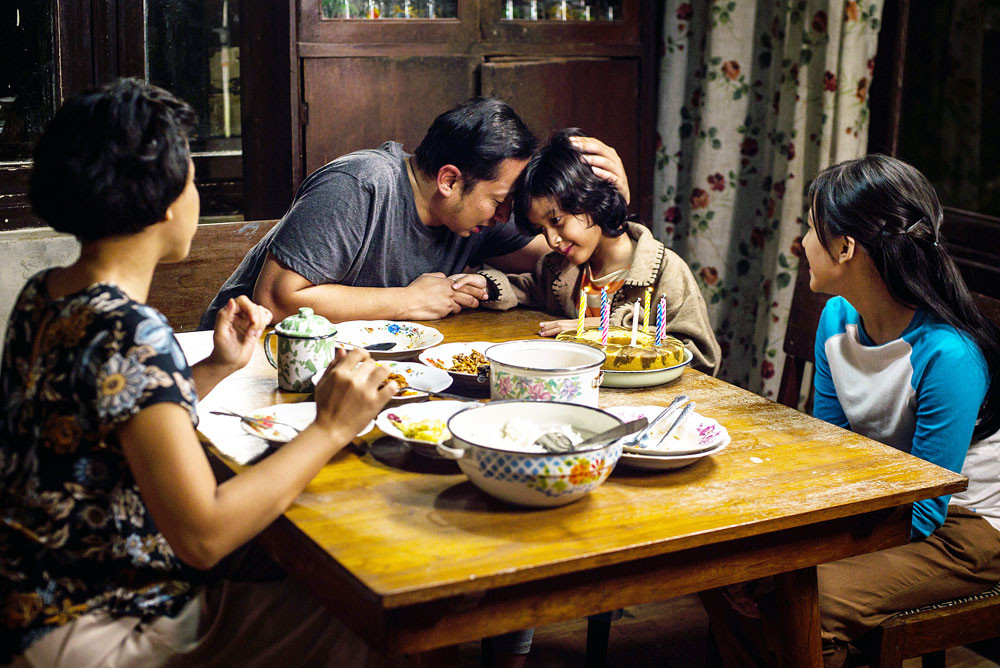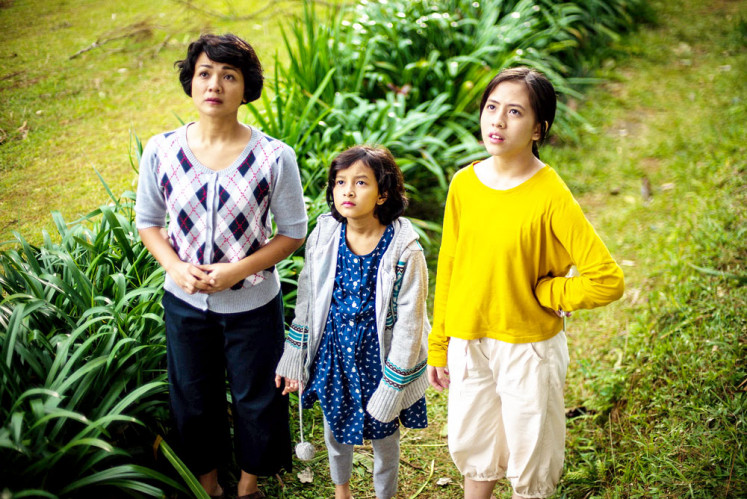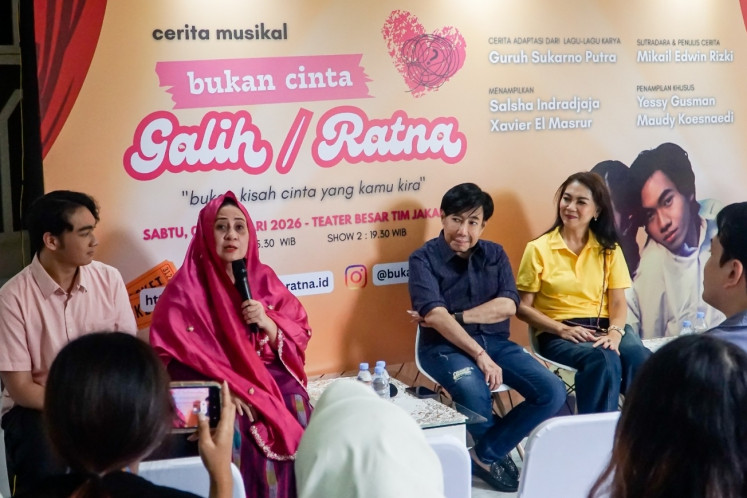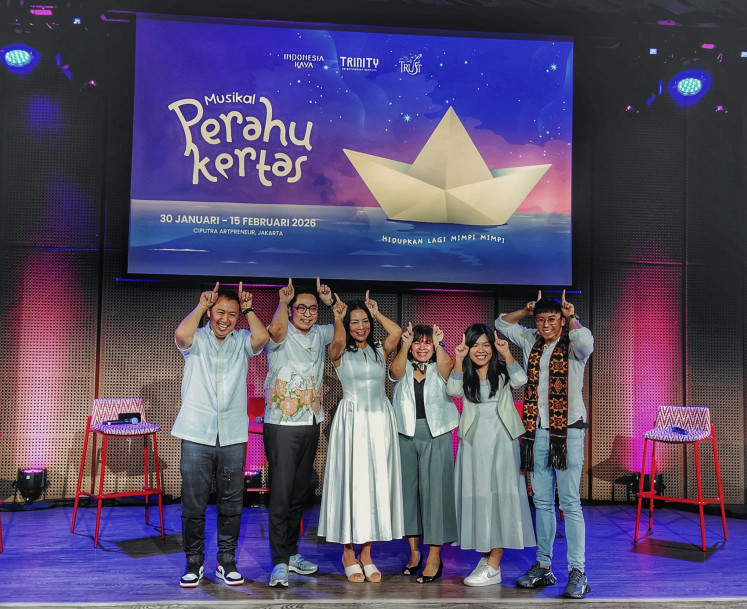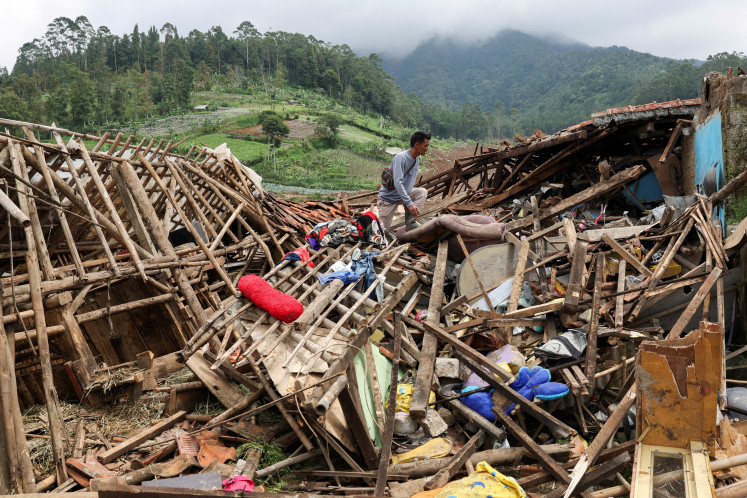Popular Reads
Top Results
Can't find what you're looking for?
View all search resultsPopular Reads
Top Results
Can't find what you're looking for?
View all search results'Keluarga Cemara' a sweet reminder of family values
The film adaptation of Keluarga Cemara (Cemara’s Family) is sweetly nostalgic, conveying touching messages that remain relevant today.
Change text size
Gift Premium Articles
to Anyone
M
onths before its theater release, Keluarga Cemara (Cemara’s Family) grabbed the public’s attention mainly because it was an adaptation of a beloved drama series first aired on television station RCTI in 1996.
A total of 412 episodes of the TV drama Keluarga Cemara were broadcast, representing quite a success by the standards of Indonesian television, dominated as it is by romantic soap operas.
Keluarga Cerita originates from the short stories written by renowned author and journalist Arswendo Atmowiloto in Hai magazine in the 1980s. The stories were later published by Gramedia in six titles.
The film Keluarga Cemara should be understood by referring to its source, Arswendo’s short stories. What is the cultural context of the original version and its silver-screen adaptation?
The Keluarga Cemara short stories implicitly, and perhaps unconsciously, reflected the dynamics of rural and urban relationships during the New Order era, particularly when Arswendo came to Jakarta in 1972 and published Hai in 1977.
This period was characterized by the domination of the consumer economy, increasing urbanization and the increasing power of the New Order regime. Arswendo’s teenage stories at the time seemed to sustain the writer’s amazement at the dynamics between the robust society in Jakarta and those living outside the capital.
In the stories, Abah, his wife and their two daughters face economic hardships that force them to leave Jakarta and start a new life in a humble village in West Java.
For Abah, the new life signifies his “return to the grassroots”. But it is a completely different matter for his eldest daughter, Euis. She has to leave her metropolitan life behind and to adapt to a village teeming with residents wishing to become urbanites.
Keluarga Cemara is a world full of people struggling with social change and the idea of wealth in reference to Jakarta. There is Ceu Salma, a moneylender, and Tante Pressier, a newly rich woman, and Abah who works as a becak (pedicab) driver and bricklayer to make ends meet.
Abah’s little daughter, Cemara or Ara, also faces her own struggle with the family’s less-fortunate state: she dreams of buying a drinking bottle and a pair of shoes that her family can’t afford. Ara’s struggle described in Hai has often been contrasted with the life of Pipin, the daughter of Tante Pressier.
In the book Keluarga Cemara: Baju Pengantin (Cemara’s Family: Bridal Gown, 2001), Arswendo queries, “Who’s actually happier and more hopeful? Is it Ara who dreams of owning new shoes, or Pipin who has no chance of dreaming as everything is available?”
For Ara and her siblings, a desire to buy things often serve as a test of their honesty and gratefulness. The family becomes a source of moral strength of its characters in facing the social changes represented by the behavior of people around them.
The Keluarga Cemara movie, written by Gina S. Noer, offers a different viewpoint on urban-rural relationships compared with its original story.
Through Ara’s eyes: Seven-year-old Widuri Putri Sasono (center) plays a cheerful girl named Cemara, aka Ara, who always finds a way to draw positives from the family’s unfortunate situations. (Courtesy of Visinema Pictures /-)Euis (Zara of girlband JKT 48) appears very urban. She is a modern dancer, smartphone user and speaks fluent English. But when she moves to the village, none of her schoolmates are fluent English speakers. Euis’ odd interactions with the villagers offer moments of refreshing humor.
Similar comedy appears on the scenes involving Abah (Ringgo Agus Rahman) and the people in his working environment. Ceu Salma, played very impressively by Asri Welas, particularly stands out with her high self-confidence despite her broken English. She commands in almost every scene she is in.
The film, however, shows no comicality in the “strange” behavior of Abah, his wife Emak and Euis as urbanites-turned-villagers.
Nonetheless, the humor in this film is one of its main strengths and makes it worth watching through its fairly long duration.
The innocent conduct of Ara, played delightfully by Widuri Putri, also offers some amusing moments. Ara is indeed the heart of this flick. She manifests the hope and honesty offered by the movie.
Ara claps her hands joyfully when Abah announces the family’s bankruptcy. Ara warmly welcomes Emak’s pregnancy, which actually poses more financial burdens for the family. Ara wants to remain seven years old forever for fear of being admonished by Abah if she grows up as old as Euis.
The movie places the Euis — Abah conflict in the main storyline. Euis shows her aversion to Abah for breaking his promises. When Euis wants to see her old friends from Jakarta, Abah gets angry and forbids her from going. When Abah takes Euis to school by his motorcycle taxi, Euis does not respond to Abah’s distant bye-kiss.
In the movie, Abah is no longer a becak driver as in the original story although a becak is present for nostalgia.
When the conflict reaches its culmination, the film conveys its message: return to the family.
Keluarga Cemara focuses on the cohesion of a family. It portrays honesty as a challenge as well as a core value in keeping the family together.
Euis threatens the family’s unity when she lies in order to meet with her friends from Jakarta. Abah makes the same mistake when he acts sternly in front of his family without admitting that he is craving the family’s attention and affection.
The message of family cohesion is indeed relevant to the social situation today. Twenty years after the Reform era in 1998, we witness how horizontal conflicts arising from identity and practical politics pose a tough challenge to our social fabric. Social cohesion seems very hard to achieve as people engange in heated political debates on social media and WhatsApp groups.
It is therefore reasonable for this film to propose family cohesion as a solution, a shelter from the storm.
This film calls on us to believe that a good, cohesive family is an asset for doing good deeds and spreading virtue in life. Although it may be scientifically inaccurate, once in a while we also need to cherish such sweet aspirations.
_______________________________________
Keluarga Cemara
(Visinema Pictures, Ideosource Entertainment and Kaskus, 110 minutes)
Director: Yandy Laurens
Writers: Yandy Laurens and Ginatri S. Noer
Producer: Anggia Kharisma and Ginatri S. Noer
Cast: Nirina Zubir, Ringgo Agus Rahman, Zara JKT48 and Widuri Sasono

